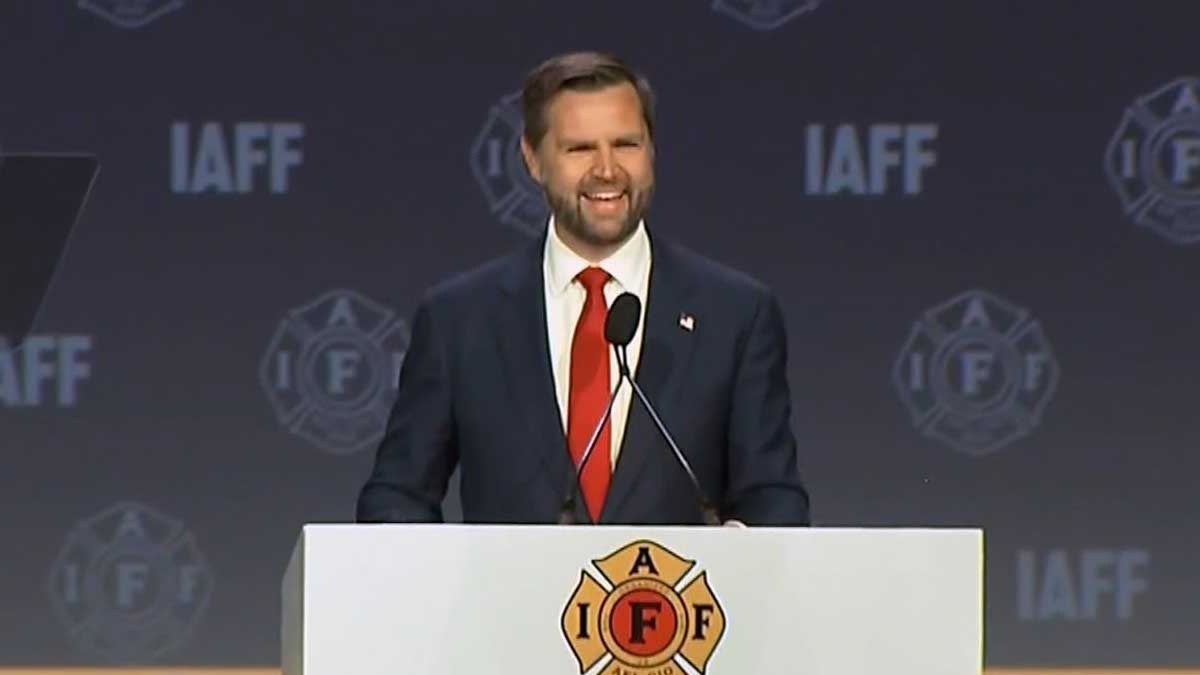- Home
- Billionaires
- Investing Newsletters
- 193CC 1000
- Article Layout 2
- Article Layout 3
- Article Layout 4
- Article Layout 5
- Article Layout 6
- Article Layout 7
- Article Layout 8
- Article Layout 9
- Article Layout 10
- Article Layout 11
- Article Layout 12
- Article Layout 13
- Article Layout 14
- Article Sidebar
- Post Format
- pages
- Archive Layouts
- Post Gallery
- Post Video Background
- Post Review
- Sponsored Post
- Leadership
- Business
- Money
- Small Business
- Innovation
- Shop
Recent Posts
Vance Faces Backlash for Resurfacing Miss South Carolina Clip

Senator JD Vance, a Republican from Ohio, has come under intense scrutiny following his decision to mock Vice President Kamala Harris by sharing a 17-year-old viral clip of Caitlin Upton, a former beauty pageant contestant. The clip, which originally gained widespread attention for Upton’s confused and incoherent response during the Miss Teen USA 2007 pageant, was used by Vance in a recent tweet aimed at discrediting Harris. The controversy has sparked significant backlash, particularly because of the emotional toll the incident had on Upton, who revealed in a 2015 interview that the public humiliation led her to contemplate suicide.
Caitlin Upton, who was crowned Miss South Carolina Teen USA in 2007, became an overnight sensation after her response to a question during the pageant went viral. When asked why she believed one-fifth of Americans couldn’t locate the U.S. on a map, Upton’s answer was a disjointed and rambling statement that made little sense. The clip was quickly uploaded to YouTube, where it garnered millions of views and a flood of mockery in the comments section. Major news outlets, including the Associated Press and The Guardian, covered the story, further amplifying the ridicule. Despite the widespread derision, Upton attempted to set the record straight shortly after the pageant. In an appearance on the Today show, the then-18-year-old explained that she had been overwhelmed by the pressure of the situation and offered a more coherent and thoughtful response to the question. Nevertheless, the damage was done, and Upton continued to be haunted by the clip for years.
On a recent Thursday, JD Vance posted the infamous clip on X (formerly known as Twitter) as a way to criticize Vice President Kamala Harris. In his post, Vance wrote, “I have gotten hold of the full Kamala Harris CNN interview,” drawing a parallel between Upton’s fumbling answer and what he perceived as Harris’s poor performance during a CNN interview. The tweet quickly went viral, with many users condemning Vance for dredging up a moment that had already caused significant harm to Upton.
Vance’s actions came under further scrutiny when he appeared on CNN the following day. During his interview with host John Berman, Vance was confronted with the fact that Upton had struggled with severe depression and suicidal thoughts in the aftermath of the original incident. Upton had shared her story in a 2015 New York Magazine article, where she described the intense emotional pain she experienced due to the relentless public shaming. When asked if he would apologize for his tweet, Vance declined. Although he claimed that he was unaware of Upton’s struggles, he defended his post as a joke, stating, “Politics has gotten way too lame, John, way too boring. You can have some fun while making a good argument to the American people about how you’re going to improve their lives.” He added, “John, I’m not going to apologize for posting a joke, but I wish the best for Caitlin.”
Caitlin Upton, now 35 years old and a model who has appeared on the reality TV show “The Amazing Race,” responded to the renewed attention by criticizing Vance’s actions. In a tweet posted shortly after Vance’s CNN appearance, Upton expressed her disappointment that the clip was still being used as a means to mock others 17 years later. She called for an end to online bullying and urged people to move on from the incident. However, her tweet was short-lived, as she appeared to delete her social media account just hours later. Upton’s reaction highlights the ongoing impact that viral moments can have on individuals, particularly when those moments are used as weapons in political or social commentary. The fact that Upton felt compelled to delete her social media account after the incident underscores the enduring emotional toll that such public shaming can have, even years after the fact.
This incident is not the first time JD Vance has found himself at the center of controversy. Since being chosen by former President Donald Trump as his running mate in July, Vance has been involved in several awkward and contentious moments. For instance, Vance was booed at the International Association of Fire Fighters Convention immediately after taking the stage. Instead of addressing the boos directly, he responded flippantly, saying, “sounds like we got some fans and some haters.” This dismissive attitude did little to endear him to the audience or the public at large. Earlier this month, Vance’s visit to a donut shop in Georgia also went viral for all the wrong reasons. When he attempted to engage with employees, his efforts were met with indifference. One worker asked not to be filmed and responded with a simple “OK” when Vance introduced himself and mentioned that he was running for vice president. The interaction, which was captured on video, quickly spread on social media, with many users mocking Vance’s awkwardness.
The controversy surrounding JD Vance’s tweet is emblematic of a larger issue in contemporary politics, where personal attacks and viral moments often overshadow substantive policy discussions. By resurrecting a 17-year-old clip that had already caused significant harm to the individual involved, Vance not only reignited old wounds but also raised questions about the ethics of using such moments for political gain. Vice President Kamala Harris, the original target of Vance’s mockery, has yet to publicly respond to the incident. Her recent CNN interview, which Vance attempted to ridicule, focused on a range of policy issues, including efforts to combat price gouging and expand access to affordable housing. Harris also reiterated her opposition to a fracking ban, clarifying her stance after previously supporting such a ban during her presidential run.
As the 2024 election cycle heats up, it remains to be seen whether incidents like these will continue to dominate the political discourse or if voters will demand a return to more substantive discussions. In the meantime, the backlash against Vance serves as a reminder of the potential consequences of using viral moments as political fodder, especially when those moments have caused real harm to the individuals involved.
Recent Posts
Categories
- 193 Countries Consortium Partner1
- 193cc Digital Assets2
- 5G1
- Aerospace & Defense48
- AI37
- Arts3
- Banking & Insurance11
- Big Data3
- Billionaires1,261
- Boats & Planes1
- Business332
- Careers13
- Cars & Bikes79
- CEO Network1
- CFO Network17
- CHRO Network1
- CIO Network1
- Cloud10
- CMO Network18
- Commercial Real Estate7
- Consultant1
- Consumer Tech194
- CxO1
- Cybersecurity73
- Dining1
- Diversity, Equity & Inclusion4
- Education7
- Energy8
- Enterprise Tech29
- Events11
- Fintech1
- Food & Drink2
- Franchises1
- Freelance1
- Future Of Work2
- Games149
- GIG1
- Healthcare79
- Hollywood & Entertainment203
- Houses1
- India’s 1000 Richest1
- Innovation46
- Investing2
- Investing Newsletters4
- Leadership65
- Lifestyle11
- Manufacturing1
- Markets20
- Media327
- Mobile phone1
- Money13
- Personal Finance2
- Policy569
- Real Estate1
- Research6
- Retail1
- Retirement1
- Small Business1
- SportsMoney42
- Style & Beauty1
- Success Income1
- Taxes2
- Travel10
- Uncategorized13
- Vices1
- Watches & Jewelry2
- world's billionaires1,230
- Worlds Richest Self-Made Women2
Related Articles
South Korea Plane Crash: A Tragic Loss and Global Mourning
The tragic plane crash at South Korea’s Muan International Airport on Sunday...
By 193cc Agency CouncilDecember 30, 2024H-1B Visa Debate Splits Trump Allies and Silicon Valley
The debate over H-1B visas has once again become a contentious issue,...
By 193cc Agency CouncilDecember 28, 2024Trump Moves $4B Stake in Truth Social Parent, Stock Drops 6%
Donald Trump recently transferred his 57% stake in Trump Media & Technology...
By 193cc Agency CouncilDecember 20, 2024House Rejects Trump-Backed Funding Bill, Shutdown Looms
The U.S. House of Representatives rejected a new government funding bill on...
By 193cc Agency CouncilDecember 20, 2024















Leave a comment